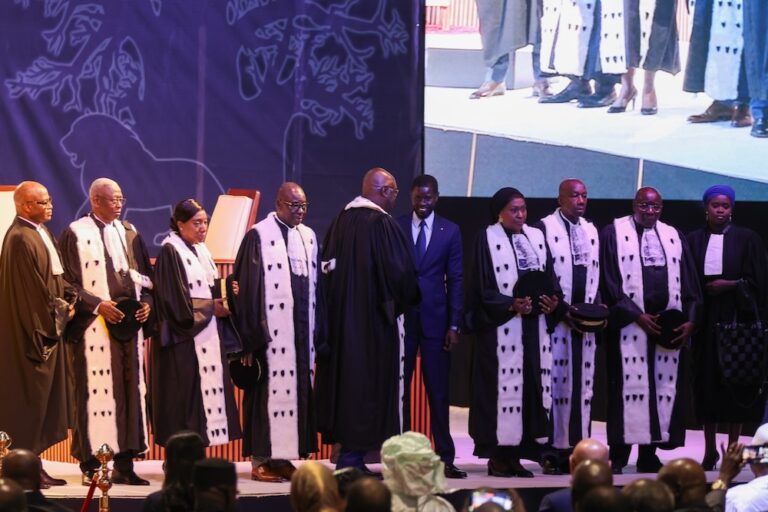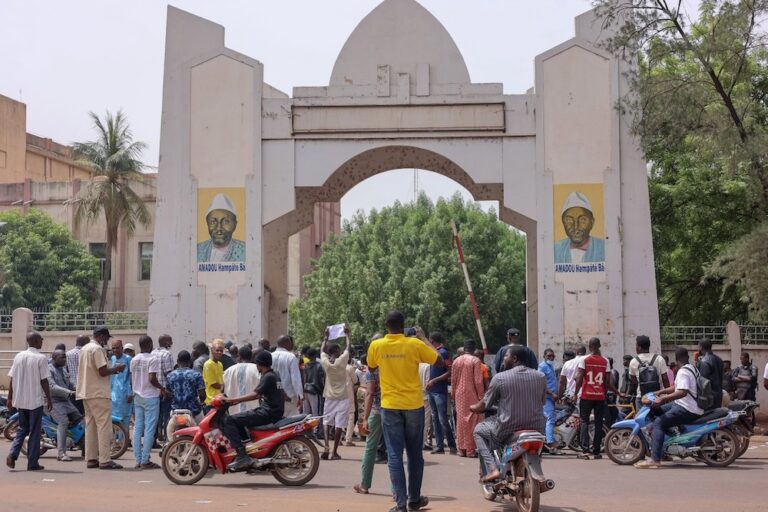December 2021 in Africa: A free expression round up produced by IFEX’s Regional Editor Reyhana Masters, based on IFEX member reports and news from the region.
Only a few bright spots in this last Africa brief of 2021, as the continent loses human rights stalwarts Archbishop Desmond Tutu and Human Rights Watch’s Southern Africa Director Dewa Mavhinga , contentious broadcasting regulations in Mauritius move forward, writer, activist and PEN-Uganda board member Kakwenza Rukirabashaija is violently arrested, and Benin’s Article 550 strikes again.
A consistently challenging year drew to a close with the tragic passing of larger-than-life South African Nobel Peace Prize laureate, anti-apartheid campaigner and well-known voice of the marginalised, Archbishop Desmond Tutu.
There were outpourings of grief and tributes from across the globe. Fondly remembered for his infectious laugh, Bishop Tutu is celebrated for speaking out against the racist system of apartheid, defending human rights, skilful negotiating skills, advocating for peace in the face of extreme violence, speaking out on behalf of ostracized communities, and so much more. As New Frame News aptly describes him: “Desmond Tutu was a teacher, preacher, ‘public enemy number one’, Nobel Peace laureate, mediator and conciliator who proved in the course of a long and caring life that he was a man for all seasons.”
His passing came just weeks after the sudden death of Dewa Mavhinga, the southern Africa director of Human Rights Watch, which also reverberated across the IFEX network and the human rights sector globally.
As described during a memorial organised by Crisis Coalition, Mavhinga “was committed to arguing things out, but did so by uplifting other people. It wasn’t the activity of struggle, he humanized the struggle… He saw the humanity of every person he was struggling with. He humanized everyone in society, the victims and the oppressors.”
What Mavhinga will most significantly be remembered for is his humility – a quality treasured by the many that paid tribute to him. But the biggest loss will be his articulate voice on the issues in the region. As HRW aptly points out: “as a sophisticated thinker and persuasive speaker, Mavhinga was an excellent advocate and much sought-after by the media. He gave thousands of interviews, yet he never sought the limelight, mentoring and helping other colleagues and activists to deliver compelling messages.”
One such interview was IFEX’s Africa podcast for the month of July, where Mavhinga shared insights into the political and human rights situation in eSwatini and recognised the resilience of thousands of Swatis fighting for democratic reforms in the country.
A bit of good news . . . and then the bad
Getting into the spirit of Christmas for a brief moment, Cameroon – which happens to be hosting the 2022 African Cup of Nations Soccer tournament – released three students: Fomusoh Ivo Feh, Afuh Nivelle Nfor and Azah Levis Gob, after reducing their original sentence to five years.
The students had been handed a 10-year jail sentence on 2 November, 2016 by a military court, convicted for “non-denunciation of terrorist-related information” after they shared a sarcastic comment about Boko Haram via SMS. According to Amnesty International (AI), they were arrested after a teacher saw a text message they had shared with each other in December of 2014. The irony-laden message: “Boko Haram recruits young people from 14 years old and above. Conditions for recruitment: 4 subjects at GCE, including religion” was a humorous suggestion that even the armed group would not recruit anyone that did not have good exam results.
AI’s west and central Africa director Samira Daoud expressed delight at their release and the fact they “were finally able to reunite with their families after seven long years behind bars.”
The bright moment was short-lived, as just days later a military tribunal sentenced 47 members of the opposition Cameroon Renaissance Movement (Mouvement pour la renaissance du Cameroun, MRC) to between one and seven years in jail for rebellion and attempted insurrection.
In early September, authorities had banned demonstrations after the MRC called on citizens to take to the streets over the government’s decision to call regional elections. Prior to planning their protests, the MRC had been pushing the government to focus on revising the electoral law and resolving the crisis in the Anglophone regions – where violence has been acute – before holding regional elections. When the protests went ahead, “Cameroonian security forces fired tear gas and water cannons and arrested hundreds of people, mainly opposition party members and supporters, to disperse peaceful protests […] Many peaceful protesters were beaten and mistreated while being arrested and in detention.”
A dark day for democracy? Tough regulations for broadcast media in Mauritius
Mauritius’s National Assembly went ahead and voted in favour of the Independent Broadcasting Authority (Amendment) Bill, completely ignoring the media sector’s vehement resistance against certain clauses contained in the law.
If approved by the president, one of the most contentious clauses allows the director of the country’s media regulation – the Independent Broadcasting Authority (IBA) – to ask a judge to compel journalists to reveal their sources while providing minimal legal safeguards for this practice. “Other major changes concern the shortened duration of radio licences, the scrapping of the Standards and the Complaints Committees, the introduction of an Independent Review Panel, administrative penalties of up to Rs 500,000, removal of community radio and TV licence categories and the possibility for the IBA to introduce new codes,” points out lecturer Christina Meetoo in her analysis in Le Mauricien.
Speaking out against the amendment bill in a Mauritius News report, People’s Voices Network president Sheila Bunwaree said: “If this bill is passed, it will be a very dark day for democracy. It is a violation of fundamental rights. We must not forget that it is through private radios that Mauritians have the opportunity to express themselves.”
In brief
One of the few bright spots in a month of rather bleak news was the addition of Congolese rumba music to the “Representative List of the Intangible Cultural Heritage of Humanity” – the UNESCO heritage list. In approving the recommendation by the Democratic Republic of Congo (DRC) and Congo Brazzaville, UNESCO is acknowledging a genre of music which “is used for celebration and mourning, in private, public and religious spaces.”
The granting of the 2021 Pax Christi International Peace Award to the Catholic Radio Network (CRN) of South Sudan and the Nuba mountains was another welcome piece of news. As Pax International highlights: “The network connects community-based radio stations to share trustworthy news and promote civic engagement. It also provides valuable public education about the Comprehensive Peace Agreement and democratic processes, which are critical for the world’s newest country.”
The arbitrary and violent arrest of novelist, government critic, activist and PEN Uganda Board member Kakwenza Rukirabashaija at the end of December caused an international outcry, with organisations demanding his immediate release. PEN International articulated its “fears for his safety and wellbeing as the security forces continue to hold him incommunicado and without charging him in a court of law.”
Uganda’s director of public prosecutions has withdrawn charges of criminal libel and offensive communication against journalist Pidson Kareire and Magara Darious. Kareire and Darious were detained in May 2021 for reporting on a debate where parliamentarians criticised a construction company for its alleged shoddy workmanship. However, Kareire and fellow journalist Mugalula Moses – from another media outlet – are also involved in another case, which has been adjourned to 18 January 2022.
After years of intimidation and persecution, which include administrative sanctions, judicial proceedings and surveillance, Togolese journalist Ferdinand Ayité was ultimately jailed on 9 December on charges of “insulting authority” and “defamation”. Joël Egah, the editor of the Lomé-based newspaper Fraternité, was jailed on the same charges the following day. Three weeks later they were both released, but under strict judicial controls.
Facing pressure from Sierra Leone’s media fraternity, rapper Alhaji Amadu Bah – better known as LAJ – opted to apologise for his crude insults against journalist and director of Radio Democracy Asmaa James. The apology did not stop James from filing a complaint with the police cyber unit.
Benin’s infamous and overly broad Article 550 of the Digital Code, widely viewed as a weapon to silence journalists online, has struck again. The latest victims of this punitive cyber law – Le Soleil Bénin Infos journalist Patrice Gbaguidi and his editor Hervé Alladé – were each handed suspended six-month sentences and fined US$861. They were convicted over an article initially published by their publication that was then reposted online. Since its enactment in 2018, several journalists have been imprisoned for breaching the law, including Ignace Sossou, Gilbert Dagan, Anatole Adahou and Argos Adihounda, sparking calls to change the law.
As the Ethiopian government seeks to control the flow of information amidst the country’s civil war, the assault on the media has been relentless. The state of emergency announced in early November has allowed the government to continue its lockdown of the northern region and general communications blackout, while arbitrarily arresting and detaining journalists. As Muthoki Mumo explains: “Ethiopia’s state of emergency law gives security personnel extremely broad powers of arrest and suspends due process, effectively bans critical journalism, and sends an intimidating message to the press”.
There has been little respite for journalists in Nigeria, and IFEX member the International Press Centre has put out a statement condemning their continued harassment. On 11 December, Vanguard journalist Ibrahim Hassan-Wuyo was threatened with death over an article he wrote in relation to upcoming elections in 2023. On 14 December, award-winning investigative journalist Fisayo Soyombo was detained at the Nigeria police national headquarters in connection with his article alleging corruption in the force. He was eventually released on bail.



